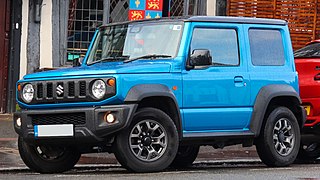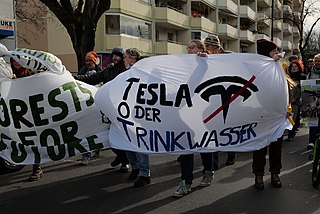Consumer Reports (CR), formerly Consumers Union (CU), is an American nonprofit consumer organization dedicated to independent product testing, investigative journalism, consumer-oriented research, public education, and consumer advocacy.

A crash test is a form of destructive testing usually performed in order to ensure safe design standards in crashworthiness and crash compatibility for various modes of transportation or related systems and components.

Unsafe at Any Speed: The Designed-In Dangers of the American Automobile is a non-fiction book by consumer advocate Ralph Nader, first published in 1965. Its central theme is that car manufacturers resisted the introduction of safety features, and that they were generally reluctant to spend money on improving safety. The work contains substantial references and material from industry insiders. It was a best seller in non-fiction in 1966.

Suzuki Motor Corporation is a Japanese multinational mobility manufacturer headquartered in Hamamatsu, Shizuoka. It manufactures automobiles, motorcycles, all-terrain vehicles (ATVs), outboard marine engines, wheelchairs and a variety of other small internal combustion engines. In 2016, Suzuki was the eleventh biggest automaker by production worldwide. Suzuki has over 45,000 employees and has 35 production facilities in 23 countries, and 133 distributors in 192 countries. The worldwide sales volume of automobiles is the world's tenth largest, while domestic sales volume is the third largest in the country.
Automobile handling and vehicle handling are descriptions of the way a wheeled vehicle responds and reacts to the inputs of a driver, as well as how it moves along a track or road. It is commonly judged by how a vehicle performs particularly during cornering, acceleration, and braking as well as on the vehicle's directional stability when moving in steady state condition.

The Chevrolet Aveo (T200) is the first generation of the Chevrolet Aveo, a subcompact automobile nameplate from the Chevrolet division of the American manufacturer General Motors. The T200 was launched in 2002, developed by the initially-independent South Korean manufacturer Daewoo, later GM Korea. It was originally marketed as the Daewoo Kalos and prominently marketed with the Chevrolet brand as the Aveo. The model received the T200 internal codes during the car's development. The T250 code was designated for the model's major facelift.

Driving simulators are used for entertainment as well as in training of driver's education courses taught in educational institutions and private businesses. They are also used for research purposes in the area of human factors and medical research, to monitor driver behavior, performance, and attention and in the car industry to design and evaluate new vehicles or new advanced driver assistance systems.
Maruti Suzuki India Limited is the Indian subsidiary of Japanese automaker Suzuki Motor Corporation. As of September 2022, the company had a leading market share of 42 percent in the Indian passenger car market. The company is known for making low-maintenance cars for the Indian market.

A rollover or overturn is a type of vehicle crash in which a vehicle tips over onto its side or roof. Rollovers have a higher fatality rate than other types of vehicle collisions.

The Ford Bronco II is a compact sport utility vehicle (SUV) that was manufactured by the American manufacturer Ford. Closely matching the first-generation Ford Bronco in size, the Bronco II was sold for the 1984 to 1990 model years, alongside the third and fourth generations of Ford's full-size Bronco. Derived from the Ford Ranger compact pickup truck, the Bronco II was produced in a single generation as a three-door wagon only, competing against the three-door version of the Jeep Cherokee introduced the same year, and the compact Chevrolet S-10 Blazer and GMC S-15 Jimmy which GM had launched as smaller, similar-named SUVs alongside their full-size Blazer and Jimmy a year prior.

The Insurance Institute for Highway Safety and Highway Loss Data Institute (IIHS-HLDI) is an American nonprofit organization. It was established in 1959, and it is noted for its safety reviews of vehicles in various simulated traffic situations, including the effectiveness of a vehicle's structural integrity and safety systems during a collision, in addition to examining improvement on such elements.

The Lexus GX is a mid-size luxury SUV sold in North American and Eurasian markets by Lexus, a luxury division of Toyota. The GX is based on the Toyota Land Cruiser Prado, from which it derives its off-road capability. Lexus introduced the first generation, known as the GX 470 in 2002, and subsequently became the third SUV to enter the Lexus lineup. A full-time four-wheel drive system is standard with low-range gearing. The 4.7-liter V8 engine in the GX 470 was the same as used on the larger LX 470. The firm next introduced the second-generation model in 2009, badged GX 460 to reflect the switch to a 4.6-liter V8 engine. Lexus later released a lower displacement GX 400 in 2012 for the Chinese market, with a 4.0-liter V6 engine.

The Suzuki Jimny is a series of four-wheel drive off-road mini SUVs, manufactured and marketed by Japanese automaker Suzuki since 1970.

The Center for Auto Safety is a Washington, D.C.-based 501(c)(3) consumer advocacy non-profit group focused on the United States automotive industry. Founded in 1970 by Consumers Union and Ralph Nader, the group focuses its efforts on enacting reform though public advocacy and pressuring the National Highway Traffic Safety Administration and automakers through litigation. For decades, it was led by Executive Director Clarence Ditlow, who died in late 2016 from cancer. Ditlow was widely admired in the auto safety community, although he also had detractors among auto manufacturers. The Center for Auto Safety is currently led by Executive Director Jason Levine.

Sport utility vehicles (SUVs) have been criticized for a variety of environmental and safety-related reasons. They generally have poorer fuel efficiency and require more resources to manufacture than smaller vehicles, thus contributing more to climate change and environmental degradation. Their higher center of gravity significantly increases their risk of rollovers. Their larger mass increases their momentum, which results in a larger braking distance and more damage to other road users in collisions. Their higher front-end profile reduces visibility and makes them at least twice as likely to kill pedestrians they hit. Additionally, the psychological sense of security they provide influences drivers to drive less cautiously or rely on their car for their perceived safety, rather than their own driving.

A traffic collision, also called a motor vehicle collision, occurs when a vehicle collides with another vehicle, pedestrian, animal, road debris, or other moving or stationary obstruction, such as a tree, pole or building. Traffic collisions often result in injury, disability, death, and property damage as well as financial costs to both society and the individuals involved. Road transport is the most dangerous situation people deal with on a daily basis, but casualty figures from such incidents attract less media attention than other, less frequent types of tragedy. The commonly used term car accident is increasingly falling out of favor with many government departments and organizations, with the Associated Press style guide recommending caution before using the term. Some collisions are intentional vehicle-ramming attacks, staged crashes, vehicular homicide or vehicular suicide.
ESUVEE was a US year-long consumer education campaign on sport utility vehicle safety in 2005. There was also an associated website game. The goal of the campaign was to encourage safe driving of SUVs. The campaign emphasized the need to drive carefully to avoid rolling the vehicles over because SUVs handle like trucks, not cars. The focus was changing driver behavior, particularly among younger male drivers.
When a person makes a claim for personal injury damages that have resulted from the presence of a defective automobile or component of an automobile, that person asserts a product liability claim. That claim may be against the automobile's manufacturer, the manufacturer of a component part or system, or both, as well as potentially being raised against companies that distributed, sold or installed the part or system that is alleged to be defective.

The Unocal 76 Challenge was an award program for the NASCAR Winston Cup Series from 1989-1999 sponsored by the Unocal Corporation. Unocal posted a $7,600 cash prize if the pole position winner for each NASCAR Winston Cup event went on to win the race. If the prize was not claimed, it was rolled over to the next race until the pot was claimed.

Tesla, Inc. has been criticized for its cars, workplace culture, business practices, and occupational safety. Many of the criticisms are also directed toward Elon Musk, the company's CEO and Product Architect. Critics have also accused Tesla of deceptive marketing, unfulfilled promises, and fraud. The company is currently facing criminal and civil investigations into its self-driving claims. Critics have highlighted Tesla's downplaying of issues, and Tesla's alleged retaliation against several whistleblowers.















